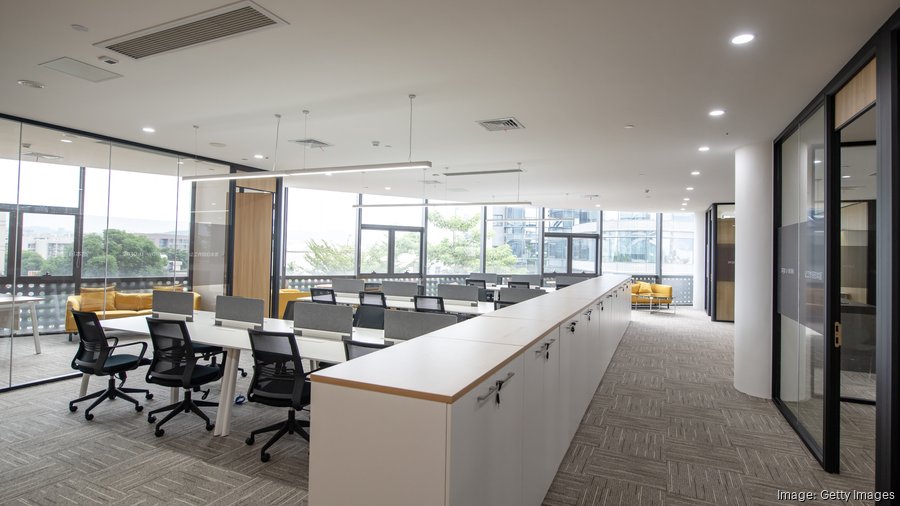WASHINGTON BUSINESS JOURNAL: A staggering amount of leases will expire in the next five years, threatening to prolong pain within the U.S. office market.
More than 800 million square feet of office space is set to expire between now and 2028, according to a recent analysis by CRED iQ, a commercial real estate data, analytics and valuation platform based in Wayne, Pennsylvania. The analysis examined officebuildings financed within the commercial mortgage-backed securities market.
According to the CRED iQ research, about 217 million square feet of office space across CMBS collateral have leases with expiration dates in 2024 or 2025. An additional 92 million square feet and 110million square feet of office space are predicted to expire in 2026 and 2027, followed by a whopping 415 million square feet projected to expire in 2028.
Those annual totals compare to 21 million square feet that expired in 2023.
It’s difficult to predict how much of the space facingexpiration might be renewed, but there’s been an observable pattern of tenants in recent years reducing their square footage and relocating to more-premium spaces when their lease terms lapse.Whether those trends will continue across the hundreds of millions of square feet of office space set to expire in the coming years will play out in the near term.
“I think we’re seeing a lot of tenants analyzing how much space they need, whether reducing or relocating to a smaller footprint,” said Mike Haas, founder and CEO of CRED iQ, adding tenants feelthey have more flexibility and leverage than in past years.
Compounding the problem is about $321 billion in commercial real estate debt set to mature in 2024 and 2025, by CRED iQ’s estimation.
A majority of the loans backing office buildings are expected to face difficulties at refinancing, thanks to higher interest rates and cost of capital, reducedoccupancy in especially non-Class A office buildings, and lower debt-service coverage ratios.
CRED iQ separately found a significant acceleration in commercial real estate distress in the second half of last year. Based on December loan-servicer reports, 15,373 loans across property types were added to servicer watchlists between July andDecember, totaling almost $100 billion in loans. There were 23,085 loans added to servicer watchlists across all of last year, meaning the second half of 2023 saw an acceleration of roughly 110% compared to the first half of the year, according to CRED iQ.
Loans are placed on watchlists when they are exhibiting potential conditions for distress, although many won’t transfer to special servicing, when a loan facing default requires an appointed special servicer to modify or otherwise work out the loan. Of the more than 15,000 loans that were added to servicer watchlists in the second half of 2023, 860 of those loans were transferred to special servicing in that same time period, CRED iQ found.
Haas said the most common tactic thus far has been for servicers to extend a distressed loan’s maturity date. It’s been most common to see three-year extensions in those types of situations, he added, although one- and two-year extensions are alsohappening.
Another factor to consider as 217 million square feet of office space expires this year and next is the ability landlords have to keep offering lofty concessions.
Since the Covid-19 pandemic, landlords have offered higher tenant-improvement allowances, longer periods of free rent and other incentives to lure a thinner pool of tenants. The ability oflandlords to continue offering those deals in a market with higher costs, including debt and construction, is somewhat questionable, said Phil Mobley, national director of office analytics at CoStar Group Inc.
Broadly speaking, Mobley said, it used to be the value of free rent and TI allowances would make up about 20% to 25% of the value of a lease. It’s become more common for that to be 30% to 40% of a lease’s value, depending on market.
Since the pandemic, many landlords have offered bigger incentive packages to tenants that sign longer-term leases, amortizing upfront buildout and other costs over a longer period of time and,ultimately, spreading out the hit to a landlord’s net operating income. Office landlords typically won’t reduce a building’s rental rate because of how loans tied to the building are underwritten.
“When you have rising rates and inflation, which makes the cost of construction higher, you can only do so much,” Mobley said. “You’re not going to have 50-year leases.
“There’s a ceiling on how much landlords can offer,” Mobley said. “I think we’re nearing that ceiling.”
While consumer prices have risen about 19% between the end of 2019 and the end of 2023, office rents nationally have risen only 2% in that same time period, according to CoStar data.
If landlords aren’t able to offer as many concessions because of costs, it’s possible more tenants will turn to higher-quality sublease space on the market — of which there is an abundance in many locales. TI packages aren’t as common in sublease deals, andfinding the right sublease space to fit size requirements for a company can be difficult, but companies looking to offload their leased real estate can frequently offer a 25% to 40% discountcompared to a direct lease with the landlord, Mobley said.
Sublease activity began to pick up in the second half of 2023, making up about 12% of U.S. office leasing activity in the fourth quarter, compared to less than 10% earlier in the year, according to CoStar.
Companies with sublease space on the market won’t all offer the same deal, but many are looking to cut their losses when it comes to their real estate.
“So far, tenants in the market have preferred the custom buildout (and) working with the landlord, but as landlords hit the ceiling for what they can offer with concessions, I suspect we’re going to see more tenants turn to the high-quality sublease space,” Mobley said.








